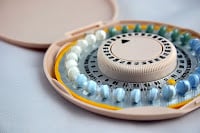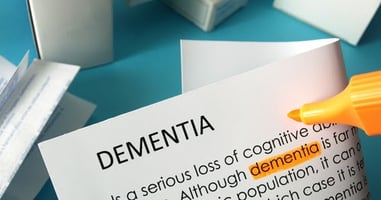Individuals with diabetes who also have depression face a greater risk of developing dementia than...
Depression Associated With Hormonal Contraception Linked to Higher Risk of Postpartum Depression

Women who have a history of developing depression after initiating hormonal contraception may have a greater risk of developing postpartum depression, according to a study published yesterday in JAMA Psychiatry.
“[A] woman’s reproductive life span is a time of heightened vulnerability for depression,” and initiating hormonal contraception has also been associated with an increased risk of developing a depressive episode, wrote Søren Vinther Larsen, M.D., of Copenhagen University Hospital and colleagues. “This study provides evidence for the existence of a subgroup of women who are sensitive to hormonal transitions across the reproductive life span.”
Vinther Larsen and colleagues used health care data from Danish national registers and included all women born in Denmark after 1978 who delivered their first child between 1996 and 2017. Participants were excluded if they had a multiple birth or stillbirth; had never used hormonal contraception; or had a depressive episode before 1996 or within 12 months prior to delivery (as this could indicate an ongoing depression while entering pregnancy).
The researchers identified participants who, prior to giving birth, experienced a depressive episode within six months of starting hormonal contraception. Depressive episodes were defined as filling a prescription for an antidepressant or being diagnosed with depression. They then identified the participants who developed postpartum depression, which they defined as filling a prescription for an antidepressant or being diagnosed with depression within six months after childbirth.
The study included 188,648 first-time mothers, of whom 5,722 (3%) had a history of depression associated with hormonal contraception initiation and 18,431 (9.8%) had a history of depression that was not associated with hormonal contraception. Those with a history of depression associated with the use of hormonal contraception had a higher risk of developing postpartum depression than those whose past depressive episodes were not associated with hormonal contraception. Further, the risk of developing perinatal depression (including depressive episodes that occurred between the third trimester and six months postpartum) was also greater for participants who had a history of hormonal contraception–associated depression compared with those who did not.
“Importantly, the findings do not imply that [hormonal contraception] use leads to a higher risk of PPD [postpartum depression] but do indicate that a history of [hormonal contraception]–associated depression may unmask [postpartum depression] susceptibility, which may prove useful as a clinical tool in [postpartum depression] risk stratification,” the authors concluded.
For related information, see the Psychiatric News article “Addressing Maternal Mental Health: Progress, Challenges, and Potential Solutions.”
(Image: iStock/crankyT)
Don't miss out! To learn about newly posted articles in Psychiatric News, please sign up here.






